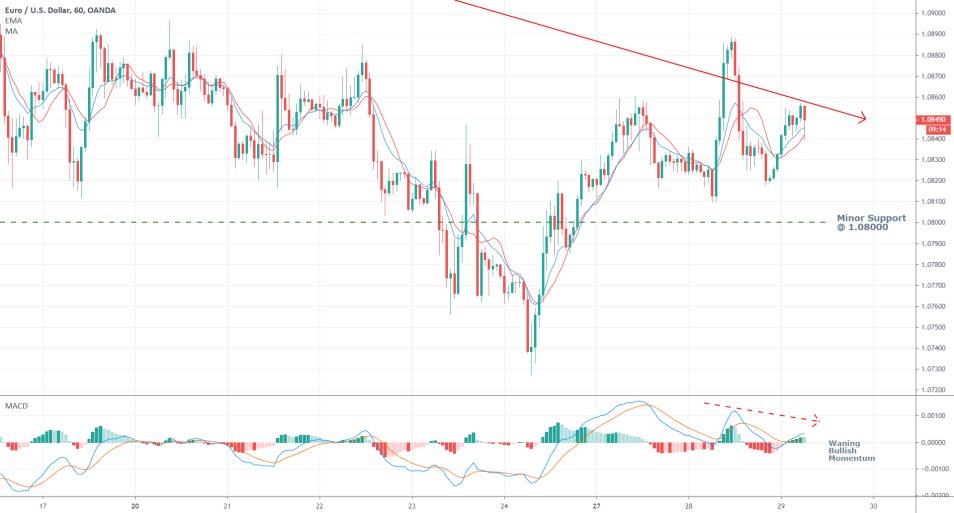
The Conference Board in the United States released its monthly issue of the Consumer Confidence Index yesterday, measuring a drastic slump in April following the sharp decline a month prior.
According to the most recent findings of the index, US consumers' confidence in April has fallen below the market expectations of 88.3 to 86.9, due to the heavier toll the coronavirus crisis is exerting on the American economy as a whole.
The index has thus depreciated by 31.9 points on a monthly basis, down from the 118.8 points that were recorded for March. The decline is mostly attributed to consumers being worried about the arising uncertainty that is brought about by COVID-19's negative impact on markets and the economy.
Lynn Franco, Senior Director of Economic Indicators at the Conference Board, commented on the findings of the report by stating that:
"Consumer confidence weakened significantly in April, driven by a severe deterioration in current conditions. […] The 90-point drop in the Present Situation Index, the largest on record, reflects the sharp contraction in economic activity and surge in unemployment claims brought about by the COVID-19 crisis."
The implications from muted consumers' outlook could be significant for the gradual economic recovery in the States that is expected to occur as the Government starts to ease off restrictions, and plans of reopening the economy are now being put in place.
While these plans of getting the general economic activity back to speed have eased some of the consumers' tensions, the uncertainty in the labour market still looms large, with over 26 million people having filed for unemployment benefits since the beginning of the crisis.
Mr Franco goes on to argue in the report that these deteriorated employment conditions and the rising uncertainty, could force many consumers to refrain from spending much capital over the next several months.
The savings rate in the country is likely to increase markedly in the next quarter, which could slow down the economy's recovery process due to subdued consumers' activity.
This, in turn, would probably impact the US dollar negatively. The safe-haven currency, which has been bolstered by heightened demand globally, especially in emerging markets, would be weakened if the consumer spending rate in the states is diminished over the next several months.
At present, the greenback continues to be trading in a range against other major currencies in the short run. The EURUSD pair is still consolidating just below the descending resistance arrow, which we highlighted in our last 'Weekly Expectations' material.

Trendsharks Premium
Gold is undergoing a correction, as investors take profits to offset losses from falling stock prices, impacting their margins. However, we anticipate a renewed wave of [...]
The Swiss stock market index is mirroring its global counterparts, such as Germany 40 and US100, experiencing a sharp decline following the announcement of new [...]
We’re analyzing the weekly chart to grasp the broader market trend. Over the past three years, the US30 index has surged by 17,000 points, often resembling a nearly straight [...]
Over the past week, the DAX has experienced a sharp decline, plunging by an astonishing 3,400 points. This downward movement is not isolated, as its international counterparts, such as the UK100 and US100, are also facing significant [...]
EURUSD recently formed a double top at 1.0930, signaling a potential trend reversal, and has since begun a correction. After a 600-pip rally since early March, a pullback at this stage is both expected and healthy. Given these conditions, we are placing a [...]
Since early March, EURJPY has surged nearly 1,000 pips, providing us with several excellent trading opportunities. However, as the rally matures, many early buyers are beginning to take profits, leading to a noticeable slowdown in the uptrend. On Friday, the pair formed a [...]
The AUDJPY currency pair continues to be dominated by bullish momentum, as multiple golden cross patterns reaffirm the strength of the ongoing uptrend. Despite this, we are witnessing a much-needed [...]
The EURAUD currency pair appears to be undergoing a trend reversal, signaling a potential shift in market direction. A notable technical development is the formation of a Death Cross on the chart, a widely recognized bearish indicator that typically suggests a [...]
After securing an impressive 200-pip profit last week, the EURJPY currency pair is now undergoing a southward correction, retracing some of its recent gains. Despite this temporary pullback, the Golden Cross remains intact, reinforcing our view that the overall trend continues to be [...]
The appearance of a Golden Cross in Silver strengthens our analysis that the metal is currently in a strong uptrend, indicating further bullish momentum in the market. This technical pattern, where the short-term moving average crosses above the [...]
This trade presents a considerable level of risk and can be classified as an opportunistic move based on recent price action. The GBPUSD currency pair has experienced a substantial bullish rally, surging by nearly 500 pips in a strong upward movement. However, after this extended period of appreciation, the pair is showing signs of a potential [...]
The anticipated Death Cross on the SMI20 appears to be failing as price finds strong support at the 23% Fibonacci retracement level. After testing this area, the index has shown bullish strength, printing several large green candles, signaling an increase in [...]
A Golden Cross has just appeared on the USDJPY chart, signaling a potential bullish move. This technical pattern occurs when the 20 period moving average crosses above the 60 period moving average, a widely recognized indication of increasing [...]
After 2 months of a down trend, we finally see some indications of price recovery for Oil. The golden cross, a historic buy signal, supports this [...]
For the past month, the German DAX40 has experienced a remarkable 10% surge, reflecting strong bullish momentum. Despite ongoing market volatility and frequent pullbacks, every dip continues to attract fresh buyers, reinforcing the [...]
Oil continues its downward trajectory, despite occasional pullbacks. The overall trend remains bearish, reinforced by multiple Death Cross patterns, a classic sell signal indicating further weakness. Adding to this bearish outlook, the critical [...]
Over the past few days, gold has experienced a sharp decline of more than $100. This downturn can be attributed in part to traders securing profits to manage their margins, which are under strain due to the significant drop in major indices. Currently, gold has fallen below the [...]
The NASDAQ 100 index is showing strong bullish momentum, as evidenced by the formation of a Golden Cross on the chart. This classic buy signal occurs when the short moving average crosses above the long term moving average, suggesting that upward momentum is [...]
The EURAUD currency pair has encountered a significant resistance level, failing to break above the critical 61% Fibonacci retracement level. This suggests that bullish momentum is weakening, reinforcing the case for a potential downward move. Given this technical setup, we favor entering a [...]
The UK100 is experiencing a remarkable rally! Over the past few weeks, the British stock market index has surged nearly 800 points. Each minor dip has attracted more buyers, fueling the bullish momentum. However, since last week, we’ve observed a slight [...]




















